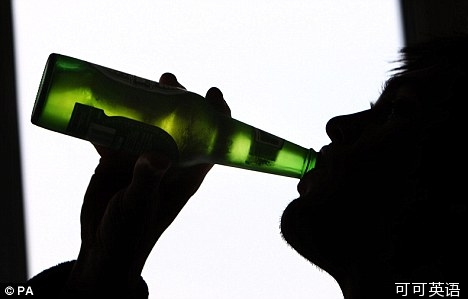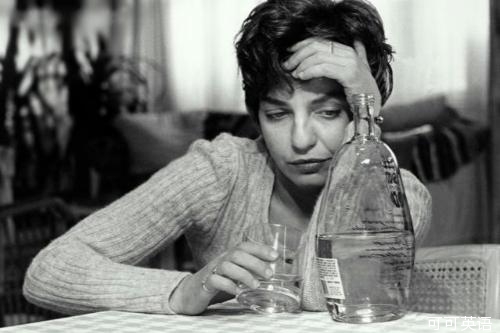
As she approached her 50th birthday, Joanna, a Pennsylvania information-technology specialist, grew tired of hiding her 1.5-liter empties from her husband. Joanna (who asked that her name be changed to protect her privacy) began attending meetings of Alcoholics Anonymous at the suggestion of her psychiatrist. In the U.S., the 12-step abstinence- and faith-based program is embraced by the nation's courts, much of the medical establishment, insurance companies and popular culture as a one-size-fits-all approach to harmful drinking.
快過50歲生日時(shí),賓夕法尼亞州信息技術(shù)專家喬安娜(Joanna,她要求隱瞞真實(shí)姓名以保護(hù)隱私)厭倦了向丈夫隱瞞自己1.5升的空酒瓶。喬安娜開始在心理醫(yī)生的建議下參加“嗜酒者互誡協(xié)會”(Alcoholics Anonymou,簡稱A.A.)聚會。在美國,這個12步戒酒及建立信心的項(xiàng)目受到了國家法院、大部分醫(yī)療機(jī)構(gòu)、保險(xiǎn)公司及流行文化的歡迎,其被視為是應(yīng)對酗酒問題的通用方法。
A.A. was founded in 1935 by two men who believed that alcohol dependence could be tamed by regular attendance at group meetings with other recovering alcoholics. Its doctrine calls for members to tame their egos, abstain from all drinking and acknowledge they are in the grip of a force they can combat only with help from a 'higher power.''
A.A.于1935年由兩位男士創(chuàng)立,他們認(rèn)為對酒的依賴可以通過定期參加與其他正在恢復(fù)的酗酒者的聚會而得到抑制。其宗旨是號召成員控制自我意識,完全放棄飲酒,并承認(rèn)他們正被一種力量所控制,只有在一種“更高力量”的幫助下才能與之抗衡。
It doesn't take an advanced degree in gender studies to realize that this approach─which has worked well for millions of people─may not be perfect for women whose biggest problem is not an excess of ego but a lack of it. Women are twice as likely to suffer from depression and anxiety as men─and are far more likely to medicate those conditions with alcohol.
不需要在性別研究領(lǐng)域取得多高的學(xué)歷就能意識到,雖然數(shù)百萬人已經(jīng)通過這種方法得到很好的效果,但對那些其最大的問題是自我意識太強(qiáng)而非缺乏自我意識的女性來說,這種方法并不完全適用。女性得抑郁癥和焦慮癥的幾率是男性的兩倍,而且用酒精來治療這些癥狀的可能性也大得多。
Many women who drink heavily are also the victims of sexual abuse and have had eating disorders. The idea of being powerless can underscore a woman's sense of vulnerability, researchers say. 'Women need to feel powerful, not like victims of something beyond their control,' says Dr. Barnes. 'It gives women power to feel they themselves can change.'
許多酗酒的女性同時(shí)也是性虐待的受害者,并患有進(jìn)食障礙。研究人員說,無力感會加強(qiáng)女性的脆弱感。巴恩斯說:“女性需要感到有力量,而不受制于超出自己控制的東西。酒精賦予女性力量,讓她們覺得自己能夠改變。”

Scientists are continuing to explore the biochemical differences in the way that alcohol affects men and women. Studies show that after drinking, men report feeling more powerful, often overstating their capabilities and accomplishments, while women say that it makes them feel more affectionate, sexy and feminine.
科學(xué)家們正繼續(xù)探索酒精對男性和女性在生物化學(xué)上的不同影響。研究表明,在飲酒后,男性表示感覺到更有力量,通常會夸大自己的能力和成就,而女性則表示飲酒后她們覺得自己更感性、性感和有女人味。
In Europe, Hong Kong and elsewhere in the industrialized world, clinicians treat alcohol-use disorders with a variety of techniques developed in the nearly eight decades since the founding of A.A. (Researchers favor the term 'alcohol-use disorder,' which encompasses a range of severity, over 'alcoholism.') Many combine different behavioral therapies with medications such as naltrexone and topiramate, which help block cravings. Both drugs have proved to be effective in helping patients abstain or moderate. Studies around the world have found that for those who are not severely alcohol-dependent, controlled drinking is possible. Advocates of the 12-step program reject these findings and continue to maintain that abstinence is the only remedy.
從A.A.創(chuàng)立后的近八十年以來,歐洲、香港及其他發(fā)達(dá)國家的臨床醫(yī)生運(yùn)用各種不同的方法治療酒精使用障礙。(研究人員覺得用“酒精使用障礙”比“酗酒”要好,前者可涵蓋各種程度飲酒。)很多醫(yī)生將不同的行為療法與納曲酮(naltrexone)和托口酯(topiramate)等抑制酒癮的藥物相結(jié)合。這兩種藥物均被證明能夠有效幫助病人戒掉或節(jié)制酒癮。世界各地的研究發(fā)現(xiàn),對酒精依賴不是很嚴(yán)重的人來說,控制性飲酒是有可能的。12步戒酒項(xiàng)目的倡導(dǎo)者對這些研究結(jié)果表示排斥,繼續(xù)堅(jiān)持認(rèn)為戒酒是唯一的治療方法。
For Joanna, wine was a nightly antidote for her pressure-filled job. It also provided a respite from a decade of depression after her parents' deaths.
對喬安娜來說,葡萄酒是晚上從壓力重重的工作中解放的良藥,它也能對自己自父母去世后已患十年的抑郁癥起到緩解作用。













